Contents
Market Overview
Macro Review
What earns more? A six-month T-Bill or the S&P 500 earnings yield? The former now has an annualized yield of 5.12%, which is the highest since 2006, as the two-year U.S. Treasury rose to a sixteen-year high at 4.94% and is close to exceeding the S&P 500 earnings yield. The second theme of the weak was European inflation surprises. Germany’s CPI came in at 9.3%, France at 7.2% and Spain at 6.1%, which were all materially higher than expectations as breakevens continually set fresh highs over the week. The ECB terminal rate rose 60bps in February and is now close to 4%. Unsurprisingly, the sell-side has coalesced around the idea of 50bps hikes in March and May, with a further 25bps in June and July. Eurozone growth also accelerated to a nine-month high, as measured by the strength in the composite PMI (52.3). Similar PMI strength was documented in China with a Manufacturing PMI that was the highest in eleven years. Weekend developments with the NPC could include China’s 2023 growth ambitions. The idea of fiscal and monetary space also seems ample, as PBOC Governor Yi Gang previously suggested that China’s real rate was at appropriate levels and releasing long-term liquidity through RRR cuts to support the real economy is still an effective card to play. The key LATAM events over the week included Ecuador’s social unrest, Colombia’s political tensions and Brazil’s leftish agenda. Within CEEMEA, Turkey’s opposition candidate selection process could be more chaotic than previously assumed, Nigeria’s incumbent political party won the presidential election, and South Africa postponed a cabinet reshuffle. Across Asia, the incoming BoJ governor stated that a near-term adjustment to YCC was not necessary policy, Sri Lanka postponed local elections, and Pakistan hiked policy rates to align itself more closely to the IMF demands.
EM Credit Update
Emerging market sovereign credit (cash bonds) ended the week -1.0% with spreads 9bps wider. Weaker performance was again driven by rising U.S. Treasury yields, with yields 9-12bps higher over the week. Sovereign outperformers were Zambia, El Salvador and Turkey, while Pakistan, Ecuador and Ghana underperformed.
The Week Ahead
Fed Chair Powell will be presenting his semi-annual monetary policy report to the House Financial Services Committee on Wednesday. Next week will also see the BOJ’s Kuroda chair his final MPC before incoming Governor Ueda takes over. Within DM, the RBA are expected to hike 25bps and the U.S. Nonfarm Payroll release comes a week later than usual. China will also host its National People’s Congress where the focus is on growth and introducing new policymakers who will steer the economy for the next five years. A slew of Chinese data is also due from CPI, PPI, trade data, FX reserves and broad money supply. Interest rate decisions across EM are due from Malaysia (2.75%), Peru (7.75%) and Poland (6.75%). Inflation reports are then expected from Brazil, Chile, Czech, Ecuador, Hungary, Mexico, Philippines, South Korea and Thailand. Finally, South Africa will furnish 4Q GDP, India will deliver the latest industrial production data and Turkey is expected to announce its opposition election candidate. Sri Lanka had also deferred March 9th local elections as usable FX fell below $500m with gross reserves of $2bn but $1.5bn is blocked by the PBoC given import cover is below three months.
Highlights from emerging markets discussed below: Break up of Turkey’s opposition alliance introduces yet another major political twist two months prior to historic presidential and parliamentary elections; Bola Tinubu wins Nigeria’s Presidency, potential legal challenges unlikely to change outcome; and Ecuador’s National Assembly resumes efforts to impeach President Lasso but latest initiative unlikely to pass Constitutional Court review.
Fixed Income
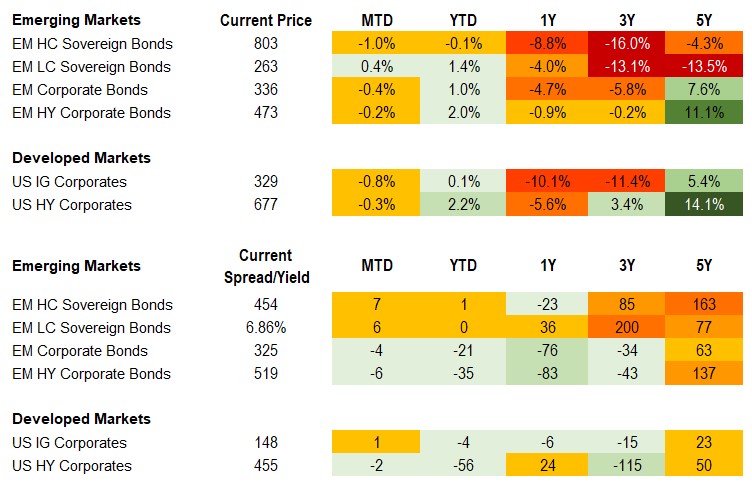
Equities
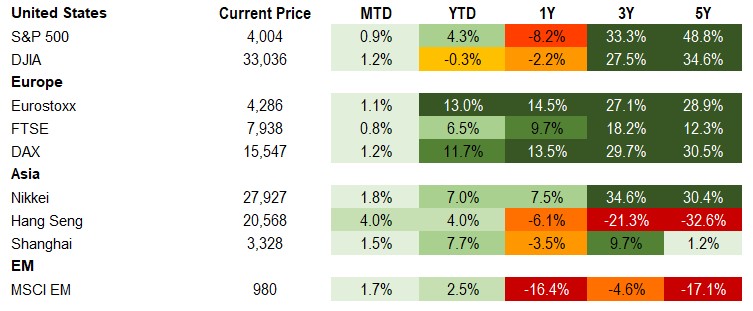
Commodities

Source for data tables: Bloomberg, JPMorgan, Gramercy. EM Fixed Income is represented by the following JPMorgan Indicies: EMBI Global, GBI-EM Global Diversified, CEMBI Broad Diversified and CEMBI Broad High Yield. DM Fixed Income is represented by the JPMorgan JULI Total Return Index and Domestic High Yield Index. Fixed Income, Equity and Commodity data is as of March 3, 2023 (mid-afternoon).
Emerging Markets Weekly Highlights
Break up of Turkey’s opposition alliance introduces yet another major political twist two months prior to historic presidential and parliamentary elections
Event: Meral Aksener, the leader of the iYi (Good) party, the second largest opposition force in Turkey, announced that her party is withdrawing from the so called “Table of Six” anti-Erdogan coalition and will not support the leader of the main opposition party CHP, Kemal Kilicdaroglu, as a joint candidate to stand against President Erdogan in the first round of presidential elections. Madame Aksener also called for popular CHP figures Ekrem Imamoglu and Mansur Yavas, the mayors of Istanbul and Ankara respectively, to formally enter the presidential race against Erdogan and offered her support to them.
Gramercy commentary: The unraveling of the anti-Erdogan opposition coalition around two months before the presumed election dates of May 14th or June 18th carries a multitude of political implications and could trigger game-changing scenarios for what many observers consider the most important and consequential elections in Turkey’s post-Ottoman history. The direction in which this newest chapter in Turkey’s pre-election drama and the implications for the electoral outcome are completely uncertain at this stage and will depend on the next moves by the key opposition players – Mr. Kilicdaroglu and Mme Aksener as well as the reaction of the Istanbul and Ankara mayors who have been called upon by Mme Aksener to enter the presidential race. For context, the two CHP mayors have consistently been shown by polls to stand a significant chance of defeating President Erdogan in a one-on-one basis, much more so than their party’s leader Mr. Kilicdaroglu. As a reminder, Mr. Imamoglu, the popular Istanbul mayor, faces pending legal action against him that is widely seen by independent observers as politically motivated and could disqualify him from participating in politics if found guilty, which complicates matters even further. For his part, President Erdogan who might have been weighing his options around potentially postponing the elections beyond the constitutionally mandated cutoff date of June 18th, could now face a new landscape with the opposition falling into further disarray and might be incentivized to go to elections as soon as possible. As for markets, given that all these major political events have taken place on Friday, investors will enter the weekend facing even more elevated uncertainty than before and will be eagerly awaiting any signals from the main players next week.
Bola Tinubu wins Nigeria’s Presidency, potential legal challenges unlikely to change outcome
Event: Bola Ahmed Tinubu of the ruling All Progressives Congress (APC) party was declared the winner in a tightly contested Presidential Election in Nigeria amid low voter turnout. Tinubu received 37% of the votes, narrowly edging his closest rivals, Atiku Abubakar and Peter Obi who received 29% and 25% of the votes, respectively.
Gramercy commentary: Given the close results and traditional allegations of electoral irregularities, the losing candidates have expressed intentions to challenge the election outcome in the courts, however, the likelihood that such challenges are successful is very low, in our view. As such, markets are likely to move on from the elections and turn the spotlight on the main economic and credit challenges that the new Tinubu Administration will be facing when it assumes office on May 29th. The incoming government will have to tackle several priority issues: removing costly petroleum subsidies, loosening foreign exchange policy, and above all, improving tax collection that is one of the lowest among global EM sovereigns and represents the key weakness in Nigeria’s otherwise relatively solid credit profile. Early signals about the Tinubu Administration’s willingness and ability to address the long-standing issue of fuel subsidies in a market-friendly manner are promising, but could be challenged by Nigeria’s weak institutional environment and traditionally noisy domestic politics. Overall, we think with election risks now in the rear-view mirror and some constructive signals by the new Administration on reforms, Nigeria sovereign spreads have room to tighten further toward levels more consistent with their underlying credit metrics.
Ecuador’s National Assembly resumes efforts to impeach President Lasso but latest initiative unlikely to pass Constitutional Court review
Event: The special committee set up by Ecuador’s National Assembly to investigate corruption allegations against President Lasso and his Administration approved a report this week recommending Lasso’s impeachment.
Gramercy Commentary: This development should not come as a surprise to markets given that the majority of the special investigation committee members recommending Lasso’s impeachment are from opposition parties. Next, the report will move to the Assembly’s floor where it needs a simple majority of 70 votes, which should not be a challenge amid strong anti-government bias in the legislature. However, we are of the view that the accusations raised by the Assembly against President Lasso face a formidable obstacle in Ecuador’s Constitutional Court. The court, which is relatively independent of political interference, will have six days to accept the impeachment recommendation for review. We think the court is unlikely to greenlight the impeachment motion as the National Assembly’s report does not appear to establish a direct link between President Lasso and corruption allegations. However, in the event it does, the impeachment proposal will return to the National Assembly where it would require an absolute majority of 92 votes in the 137-seat chamber. During the previous attempt to impeach Lasso back in June 2022, which happened amid violent street protests paralyzing the country, the Assembly came short of the constitutionally required mark by 12 votes. As a reminder, President Lasso has been under increasing political pressure domestically since early February when a referendum called by him in an attempt to strengthen his domestic political standing backfired and emboldened the populist opposition. As a result of intense political noise, Ecuador’s sovereign bonds have given back all their impressive gains since October 2022, turning the sovereign from the best to worst performer in EM. Current valuations that have reverted to pricing a significant probability of sovereign debt distress are detached from Ecuador’s credit fundamentals, in our view, and would need to correct significantly if the worst-case scenario of Lasso’s impeachment does not materialize over the next three to six months.
Emerging Markets Technicals
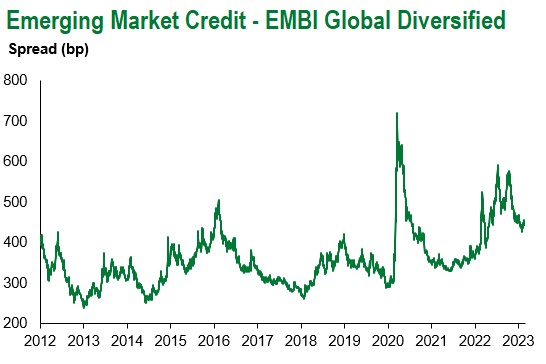
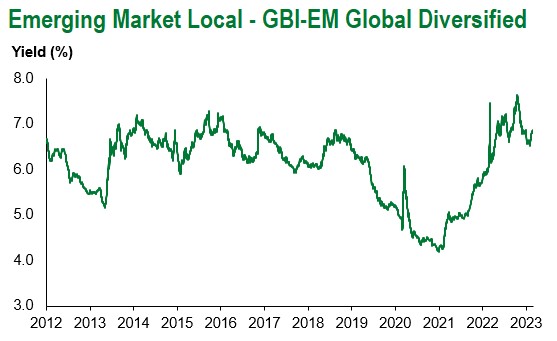
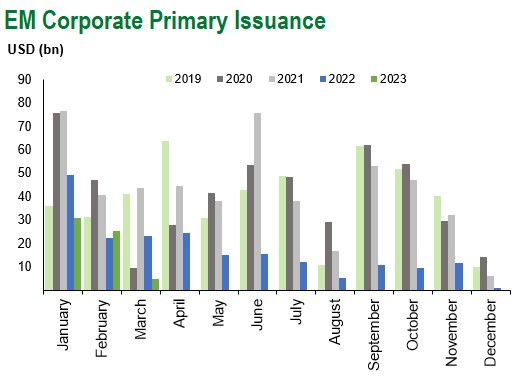
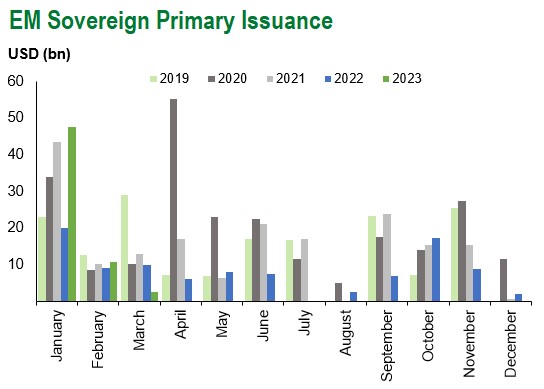
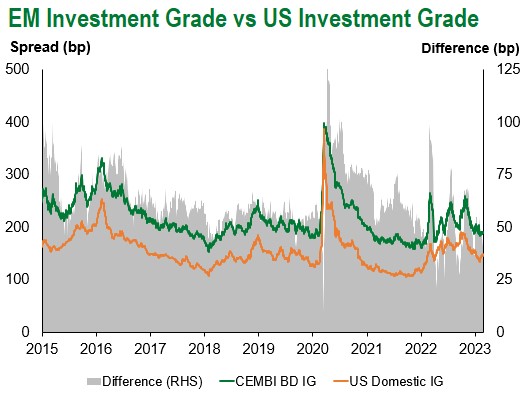
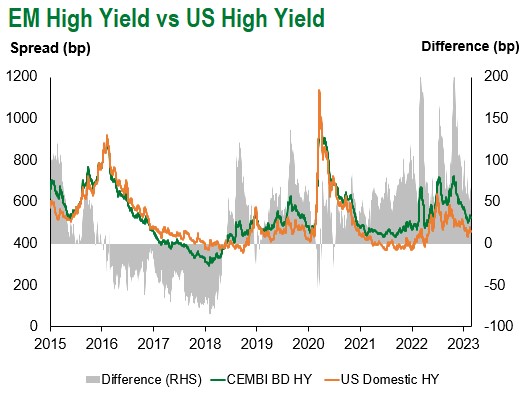
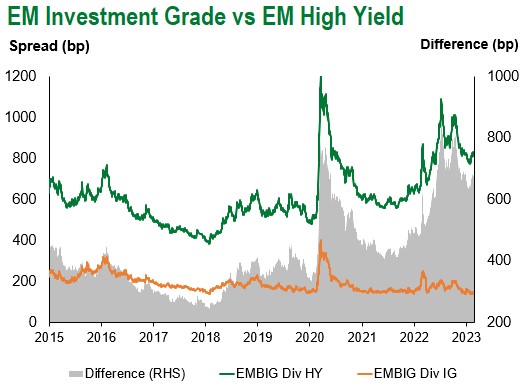
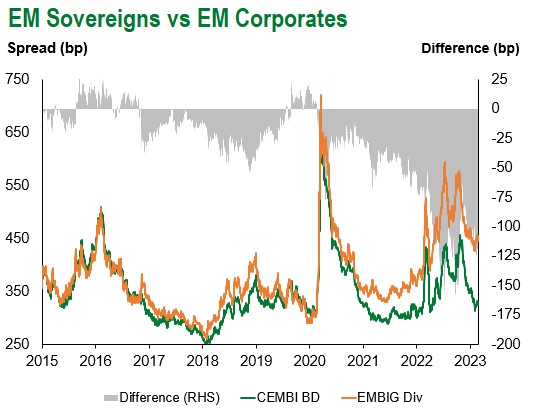
Emerging Markets Flows
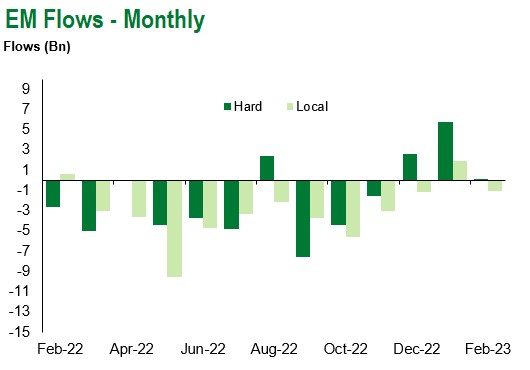
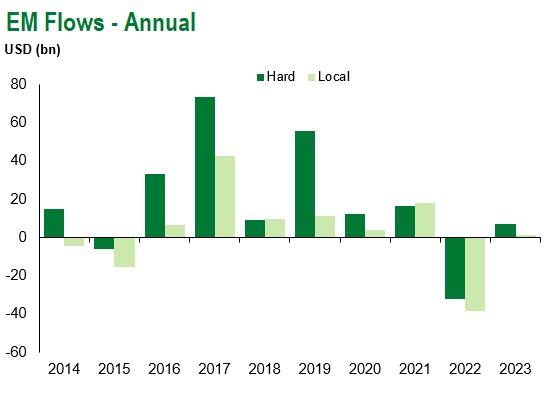
Source for graphs: Bloomberg, JPMorgan, Gramercy. As of March 3, 2023.
COVID Resources:
Johns Hopkins COVID-19 Case Tracker
For questions, please contact:
Kathryn Exum, CFA ESG, Director, Co-Head of Sovereign Research, [email protected]
Petar Atanasov, Director, Co-Head of Sovereign Research, [email protected]
James Barry, Director, Deputy Portfolio Manager, [email protected]
This document is for informational purposes only. The information presented is not intended to be relied upon as a forecast, research or investment advice, and is not a recommendation, offer or solicitation to buy or sell any securities or to adopt any investment strategy. Gramercy may have current investment positions in the securities or sovereigns mentioned above. The information and opinions contained in this paper are as of the date of initial publication, derived from proprietary and nonproprietary sources deemed by Gramercy to be reliable, are not necessarily all-inclusive and are not guaranteed as to accuracy. This paper may contain “forward-looking” information that is not purely historical in nature. Such information may include, among other things, projections and forecasts. There is no guarantee that any forecasts made will come to pass. Reliance upon information in this paper is at the sole discretion of the reader. You should not rely on this presentation as the basis upon which to make an investment decision. Investment involves risk. There can be no assurance that investment objectives will be achieved. Investors must be prepared to bear the risk of a total loss of their investment. These risks are often heightened for investments in emerging/developing markets or smaller capital markets. International investing involves risks, including risks related to foreign currency, limited liquidity, less government regulation, and the possibility of substantial volatility due to adverse political, economic or other developments. References to any indices are for informational and general comparative purposes only. The performance data of various indices mentioned in this update are updated and released on a periodic basis before finalization. The performance data of various indices presented herein was current as of the date of the presentation. Please refer to data returns of the separate indices if you desire additional or updated information. Indices are unmanaged, and their performance results do not reflect the impact of fees, expenses, or taxes that may be incurred through an investment with Gramercy. Returns for indices assume dividend reinvestment. An investment cannot be made directly in an index. Accordingly, comparing results shown to those of such indices may be of limited use. The information provided herein is neither tax nor legal advice. Investors should speak to their tax professional for specific information regarding their tax situation.
